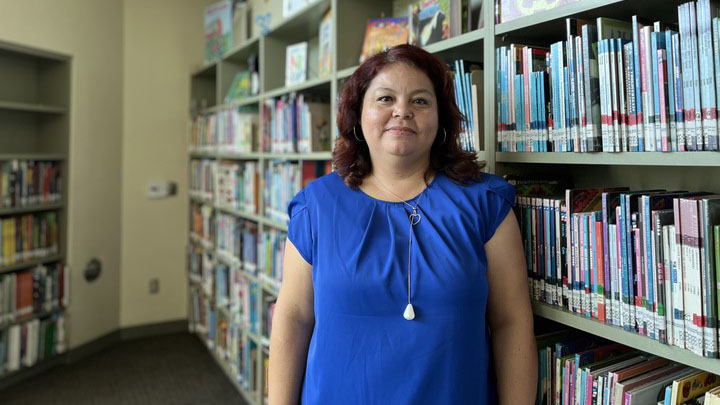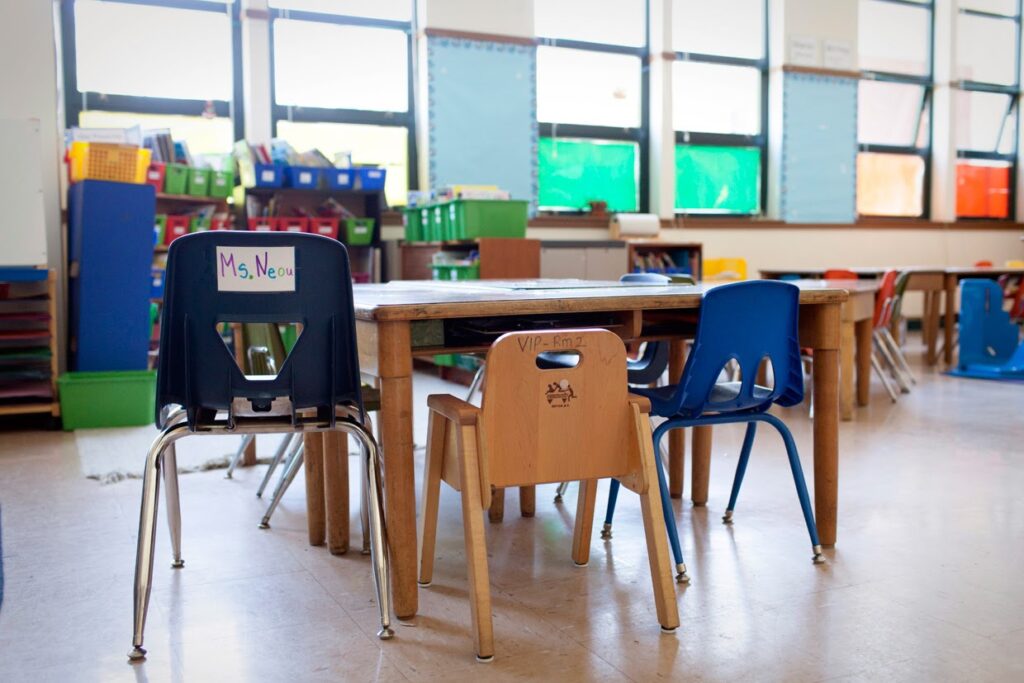
Dolores Huerta Elementary principal Estela Lopez. Credit: Mallika Seshadri / EdSource
When Estela Lopez was about 7 years old, her brother told her she could join in on an adventure — provided she stayed strong, followed instructions and didn’t cry.
After school one day, Lopez and her older brother trekked across the street to their local school in what used to be South Central Los Angeles and climbed over the walls, jumping from one room to the next despite hearing their mother calling their names.
By chance, Lopez stumbled on a recycling bin packed with paper worksheets. She grew excited and rummaged for more.
“I went into the trash cans, and I started looking at different worksheets, and I started taking them out,” Lopez said. “I had a younger sister, I was like, ‘You know what, we’re going to play school. I’m going to be the teacher. You guys are going to listen to me.’”
What started out as play that day — with her sisters sometimes complaining, “You always want to be the teacher; you always want to have us doing work” — led Lopez to begin her journey as an educator, as she began to notice the positive effects of her methods at home.
“One of my sisters was very strong in reading, but I saw that my other sister was struggling,” she said, so she just helped them with their homework. “The expectation, since I was the oldest, was to get home, help my sisters with homework, help around the house while both of my parents were working 12 hours a day.”
The community Lopez grew up in lies in what is now South Los Angeles — and she still lives and works just a five-minute drive from where she was raised on 49th Street. But since she took over as the principal of Dolores Huerta Elementary, Lopez has gone beyond teaching reading and writing — working her way from being a coordinator who supports English learners, to assistant principal, to a principal who extended her reach far beyond the classroom to help families secure housing and deliver critical supplies during the height of the Covid pandemic.
Ryan J. Smith, the chief strategy officer at the LA-based organization Community Coalition that works to “upend systemic racism,” said Lopez has worked diligently with LAUSD and has established various community partnerships to help create safe passage routes near the school.
And when a parent can’t take their child to school, Lopez and assistant principal Sandra Sandoval step in.
“We had a kiddo last year who is being raised by grandpa, and he was having a hard time picking her up from school. He was going through chemo treatment. … And so we took turns walking her home and picking her up in the morning so she would get to school safely,” Sandoval said.
“We will do whatever we need to do to make sure that our kids are safe and getting to school and … at least being kids and not dealing with big people problems for six and a half, seven hours a day.”
Supporting students’ families
Virtual learning due to Covid was particularly challenging, Lopez said, as many students did not log onto their online coursework.
So, she and her fellow administrators began going door to door, but they quickly realized that a lot of the families also did not have masks to stay healthy.
“We would get to the homes, and we would ask them to come out, and they were like, ‘We don’t have any face masks,’ some of the essential things,” Lopez said. “So we started carrying them in the cars, and we started giving them to the families because these are the families we’re supporting. They don’t have face masks. They’re not protecting themselves.”
Around that same time — as rents skyrocketed — Lopez helped organize town halls and workshops for parents to learn about housing security in an attempt to avoid eviction.
“We find sometimes when we’re looking at enrollments, we see the same address three or four times,” Lopez said. “That means there’s three or four families living under one roof. And sometimes we find out it’s only a two-bedroom, and that’s what our kids deal with on a daily basis.”
According to Ryan, that level of community outreach is critical, and Lopez has acquired a “profound” understanding “that students need all things to thrive.”
A time to heal
For Lopez, however, that period of seclusion wasn’t just about supporting families in her community. It was also about healing herself.
Lopez missed the students when they were home during the pandemic. “I really did. I missed that laughter outside. I was only hearing the little birds,” she said. “But I think I needed that time because, during that time was when my son (Mauricio) passed away, and I wasn’t in a good place to be their school leader. I needed that time to cope, but I also needed that time to heal.”
Mauricio was the eldest of Lopez’s three sons, born when she was a 17-year-old high school senior.
She recalled that Mauricio was only 4 months old when he watched her take the stage as a high school graduate. And he watched her again, as an adult with a daughter of his own, when she shared her story for the first time at a celebration of the school’s 10th anniversary in 2019 — when Lopez also met civil rights icon Dolores Huerta in person for the first time and began her yearslong relationship with her.
“Sharing about becoming a teenage mom, sharing about the LA riots, sharing about the challenges of being a parent that was raising three Latino boys and the conversations with them. Sharing that I left (home) when I was only 15 years old. Sharing how difficult it was to grow up in a home where my dad was an alcoholic and how my ex-husband became an alcoholic and I didn’t want to continue that cycle with my son,” Lopez said.
While Ryan eventually convinced her to speak at the event, Lopez said, that was one of the hardest decisions she has had to make — but that it was ultimately an opportunity to honor the five most important people in her life who continually motivated her to keep going: her parents and her three sons, Mauricio, Ivan and Julian.
Lopez said that after she spoke, Huerta embraced her and said, “You’re strong, mi hija. You’re a strong woman.”
But in the wake of Mauricio’s death, Lopez questioned whether she should remain an educator.
“I went back and thought about the times that I wasn’t with him and the times that I felt that I invested so much on me and not on him … or my last conversation with him,” Lopez said.
“I was working on the main office to make it look pretty for our students, and he called me that Saturday, and he said, ‘Mom, are you coming home?’ And I said ‘Not yet, mi hijo.’ I said I want to finish painting the office because I don’t want to be here on Sunday. And he said, ‘That’s cool, mom. I love you. I’ll see you tomorrow.’”
Ultimately, Mauricio’s wife, Alejandra, showed Lopez her son’s social media posts, which reminded her of her purpose.
“I’m very proud of you, mama. You make me strong,” Mauricio had written. “Keep the work going. You’re helping the little kids out.”
Life at Dolores Huerta Elementary
Despite having had three sons and a granddaughter (who attends Dolores Huerta Elementary) of her own, Lopez has regarded the students as her “other children.”
“All I have to do sometimes is look at that window … and when they pass by, and they’re showing me their little cards or they’re smiling, that’s worth it,” she said.
When a student arrives late, Lopez said she immediately takes them to the cafeteria to eat something. When a student cries, she offers comfort. And when a student doesn’t seem responsive in the morning, she and her staff check on them throughout the day.
“I know how challenging it can be out there,” said Lopez, who views the school as a shelter for children from some of their difficulties. “I want to make sure that when we open the doors in the morning, everything is left outside.”
Students at the school, including Samantha Estrada Flores, said she has admired Lopez as an “amazing woman” who organizes fun activities for the children. And, Ernesto Gallardo, a fifth-grader running for student council president, said when he walks through the gates each morning, “I’m always happy.”
“At the beginning, when (Mauricio) passed away, it was hard for me to say I have three sons, but now, I have three sons: two with me, and one that’s not with me right now — but the one that taught me how to be a mom,” Lopez said. “And with that learning, I learned to be a strong leader and for my community to know that I’m here to support them in any way that I can. That’s my mission.”


